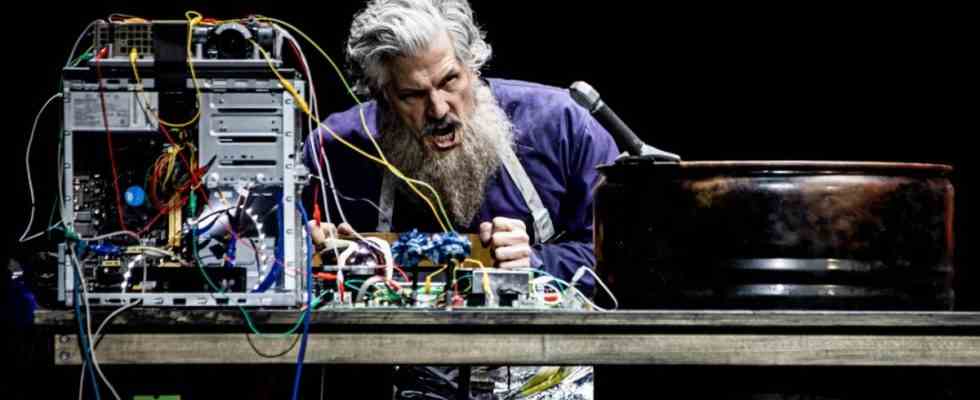On May 13th there will be a big farewell party, then the Coburg State Theater will have to close its doors for an indefinite period. Up to now it has been played in a classical building, which is beautiful on the inside and was completed in 1838, directly opposite Ehrenburg Palace, which was also being redesigned in the Empire style at the same time. Various defects such as outdated stage technology and a lack of fire protection make this necessary.
Hopefully by autumn there will be opera, operetta, ballet and drama again in a newly built interim, which should have been finished long ago and is called “Globe” because of its rotunda. Inside, however, it has little in common with the famous Globe Theatre, because although there is no lower machinery or a rigging loft, there is a proscenium stage, and the orchestra pit is even larger than in the old theatre.
The 58 musicians for the “Ring des Nibelungen” in the version by Gotthold Ephraim Lessing, who was the first Kapellmeister in Coburg from 1933 to 1935, fit in just fine. Two of the original four Wagner tubas alone take up a good deal of space, but in contrast to the strings, which are reduced by almost half at just under 30 in total, the wind instruments in this version do not have to be cut back in many places.
“Only in a few places, such as the beginning of ‘Rheingold’, the ‘Feuerzauber’, funeral march or for the final song, is all the wind instruments needed,” explains chief conductor Daniel Carter during a break in the dress rehearsal “Siegfried” premiere. “Most of the time there are no notes missing in between, but the remaining players no longer have a break between a big solo and the rest of the game.”
The fact that the “Götterdämmerung” takes place in the “Globe” is not really a drawback
Over the course of two acts, it sounds very vividly out of the ditch, and even the reduced string instrumentation turns the weaving of the forest into true chamber music in this small space. But in the third act everything is a little different, because in the 15 years between the second and third act Wagner composed “Tristan” and “Meistersinger” as is well known, and the musical network of relationships is now much more complex and dense.
That almost bursts the small moat and pushes the theater with its 444 seats to its acoustic limits, while the singers still sound very good in a room that used to have a lot of wood built into it. The fact that the “Götterdämmerung” will take place in the “Globe” in the next (and cyclical “Ring” performances within a week then in the week after next) is not really a shortcoming.
The Landestheater Coburg needs to be renovated.
(Photo: Daniel Karmann/picture alliance/dpa)
Director and stage designer Alexander Müller-Elmau lets his tetralogy (preceded by “Rheingold” in October 2019 and after a long Corona break “Walküre” in April last year) play in a kind of theater museum. In “Siegfried” a large golden brain floats down, which once represented the forged Rheingold, now the heart of the dragon Fafner, who had stolen this “hoard”. He sings out of a kind of gigantic gramophone and breathes his life out in the almost naked, powerful figure of the great bass Bartosz Araszkiewicz.
In the first act, a tent as a hiding place for Mime (very agile in acting and singing: Simeon Esper) dominated the sparse stage lined with black plastic sheeting, while at the end a forest fire painted photorealistically in oil symbolizes both the wall of fire behind the one in a glass cube Brünnhilde is asleep, anticipating the end of the gods with the fire in Valhalla.
Again, the young Swede Åsa Jäger sings Wotan’s favorite daughter with an impressively clear, dramatic soprano, and Patrick Cook from the Deutsche Oper Berlin also has a radiant, youthful, heroic tenor. However, due to illness, he was able to sing the whole part with an orchestra for the first time in the dress rehearsal, apart from a few moments when he had to take it easy.
Patrick Cook as Siegfried.
(Photo: Annemone Taake)
That’s why the management team has found an unusual solution for the premiere on Sunday in the past few days: The Hungarian Zoltán Nyári from the ensemble of the Oldenburg State Theater mingled with the extras who have been watching events from the future since “Rheingold” to If necessary, to be able to continue singing and playing as Siegfried during the performance. For the premiere it was planned that he would definitely take over Cook’s Siegfried with the walk through fire to Brünnhilde.
In the dress rehearsal, on the other hand, there was a nice silent game between him as the second Siegfried and the forest bird, which is sleeping here on a metal trolley with wheels and triggers Siegfried’s erotic awakening, while Brünnhilde up to her “Heil Dir Sonne, Heil Dir, Licht” cries while sitting on the backstage.

